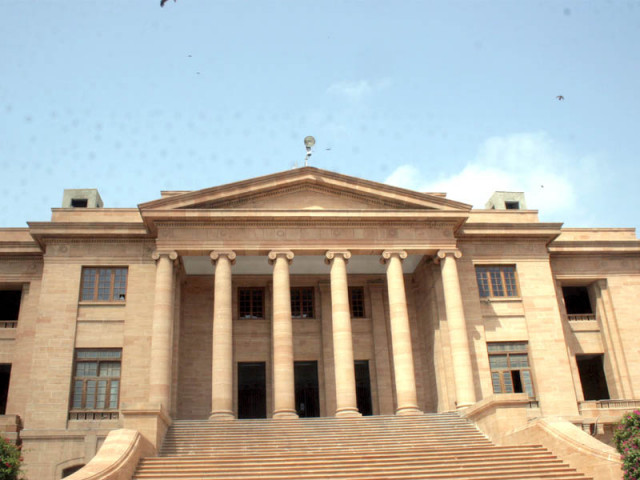SHC proposes way to expeditious hearing of appeals
Pearl case judgment says state is obligated to ensure that no person is deprived of his liberty

Sindh High Court : PHOTO: EXPRESS
The judgment, delivered on Thursday, described appeal as “continuation of trial” and proposed that the high courts needed to put in place a system for expediting the hearing and deciding old appeals to ensure that Article 10-A of the Constitution is complied with.
An SHC division bench, comprising Justice KK Agha and Justice Zulfiqar Sangi, on Thursday acquitted four men, including Ahmed Omar Saeed Sheikh, who was sentenced to death by an anti-terrorism court in 2002 for masterminding Pearl’s murder. The other three were awarded life sentence.
“An appeal is continuation of trial and in our view under Article 10 (A) of the Constitution which envisages an expeditious trial it also envisages an expeditious hearing and decision of an appeal if one is filed,” said the 40-page judgment authored by Justice KK Agha.
“In our view to keep appeal pending for years… regardless who is at fault is tantamount [to] violation of Article 10-A of constitution and ultimately it is for the judges before whom such cases are fixed to use their judicial authority to ensure that such appeals are decided expeditiously,” the judgment added.
It proposed that the high courts needed to put in place a system to expedite the hearing and decide old appeals to ensure that Article 10-A is complied with. It also proposed that a 5-year-old appeal could be put in yellow file. Likewise, between 5- to 10-year in blue file and over 10-year be put in green file.
The court also noted that if a person is released after spending sentence before the decision of his appeal would amount to fraud on both appellant and the criminal justice system.
“If a convict is acquitted after serving 18 year[s] of imprisonment in jail then he cannot make up for the loss of such precious time and is not compensated for it. In such case, if a man had a young child say 3 year old at the time of sentencing, he would have completely missed that child growing up who would be almost an alien to him at the time of his release,” the ruling said.
“Even if convict’s conviction is upheld by a high court he can at least, if he chooses to expeditiously move on to the next level of the appellant process which is his right and from where he may still get relief.”
The court noted that the right of appeal is meaningful in criminal cases only if it is decided expeditiously which is also an obligation of the state to its convicted citizens to ensure that no person is deprived of his liberty for no longer and the same right is guaranteed in the Constitution.
It said that Daniel Pearl case was extremely high profile wherein not only the country’s high-ups wanted fast result – safe recovery of Pearl and if not then book those responsible for his abduction but also “one of our closest allies who sent their investigation and experts” to assist the Pakistani police.
“In this background, we are in no doubt that Pakistani police was under huge pressure to ‘get results’ either in terms of safe return of Pearl or arrest of those responsible for his disappearance. Under these circumstances, it would not be completely surprising if the police resorted to rough tactics in order to extract confessions. This is not new phenomenon only in developing societies but also in developed societies unless stringent laws are made to prevent such practices and are also implemented,” the judgment said.

1724319076-0/Untitled-design-(5)1724319076-0-208x130.webp)

















COMMENTS
Comments are moderated and generally will be posted if they are on-topic and not abusive.
For more information, please see our Comments FAQ